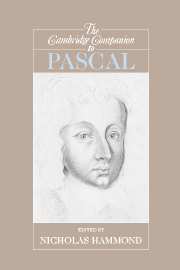Book contents
- Frontmatter
- Introduction
- 1 Pascal’s life and times
- 2 Pascal’s reading and the inheritance of Montaigne and Descartes
- 3 Pascal’s work on probability
- 4 Pascal and decision theory
- 5 Pascal’s physics
- 6 Pascal’s philosophy of science
- 7 Pascal’s theory of knowledge
- 8 Grace and religious belief in Pascal
- 9 Pascal and holy writ
- 10 Pascal’s Lettres provinciales
- 11 Pascal and the social world
- 12 Pascal and philosophical method
- 13 Pascal’s Pensées and the art of persuasion
- 14 The reception of Pascal’s Pensées in the seventeenth and eighteenth centuries
- Bibliography
- Index
1 - Pascal’s life and times
Published online by Cambridge University Press: 28 May 2006
- Frontmatter
- Introduction
- 1 Pascal’s life and times
- 2 Pascal’s reading and the inheritance of Montaigne and Descartes
- 3 Pascal’s work on probability
- 4 Pascal and decision theory
- 5 Pascal’s physics
- 6 Pascal’s philosophy of science
- 7 Pascal’s theory of knowledge
- 8 Grace and religious belief in Pascal
- 9 Pascal and holy writ
- 10 Pascal’s Lettres provinciales
- 11 Pascal and the social world
- 12 Pascal and philosophical method
- 13 Pascal’s Pensées and the art of persuasion
- 14 The reception of Pascal’s Pensées in the seventeenth and eighteenth centuries
- Bibliography
- Index
Summary
We know little about Pascal. We also know a great deal about Pascal. We know little in the sense that Pascal never wrote about himself or his life in any detail, while contemporaries who did write about him offered something close to hagiography. We know a great deal about him in the sense that his writings on science and human nature, society and salvation, tell us much about his view of the world and the developments of his day. We know or can confidently infer, to take a few random examples, how he perceived birth and death, royalty and papacy, Epictetus and Descartes, hare coursing and theatre-going, the execution of Charles I and the Peace of the Pyrenees. Indeed, to the extent that his perceptions were always fresh and insightful - and that taken together they offer an almost unfathomably original and subtle philosophical vision - it is easy to feel that we know him intimately.
CHILDHOOD
France of the 1620s and 1630s, the France in which Pascal was raised, was one of Europe’s major powers, the centre of a vibrant movement of Catholic renewal and of an increasingly educated and refined ruling class. But it was also a place of seething conflict and chronic political instability. The Wars of Religion, which very nearly led to the permanent break-up of France, had come to an end in 1594, when Henri IV took Paris, but civil war – identified by Pascal as ‘the worst of evils’ – remained a very real peril (L 94/S 128).
- Type
- Chapter
- Information
- The Cambridge Companion to Pascal , pp. 4 - 19Publisher: Cambridge University PressPrint publication year: 2003
- 4
- Cited by

